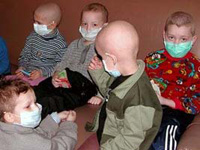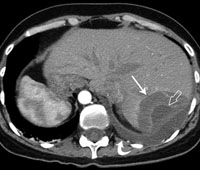How to talk to a child about his illness? What questions can ask a child? How to support a child during illness? Answers to these questions you will find in the article.
Content
Your life: how to explain the sick child that happens to him?
Studies have shown that most children are all
Equally it is conscious that they are seriously ill against the attempts of parents and
doctors protect them. At times he feels bad, his often
inspect doctors, it is necessary to pass very unpleasant and frightening
Surveys and procedures. Anxiety of relatives and loved ones also not
Stay unnoticed. And if no one tells him about illness, baby
can look for an explanation for what is happening in his imagination in his own
fear. He can decide that his illness is punishment for some
his actions, worry and blaming himself. Therefore, now doctors
agree that the truth about the disease will protect the child from the sense of guilt and
will help him in treatment.
Conversation with a child about the disease
But there are issues such: «Who should tell the child the truth about the disease?» «When to do it?» «What exactly must be said?»
Who should talk with the child? The answer to this question will be in different families different.
It depends on your child relationship. It is very difficult to say
he is that he has an oncological disease. Maybe you decide
say to the child all themselves or ask the doctor to clarify the child to his
disease. In any case, you or someone who is close to the child must
be close to support, encourage him, express your love.
If you decide to talk to your child yourself, discuss
pre-all with someone who can help you decide what and how
Better to say. You can give good advice to the doctor who attending your
child, nurse or psychologist. It is useful pre-
Discuss these questions with parents of other sick children can help
Members of parental associations, such as the children's section of Moscow
ONCOLOGICAL COMPORY SOCIETY. Think what you want
say rehearse in front of the mirror.
When to say? Since you are better than anyone, known
Features of your child, his mood, exactly you are best
can decide when it is best to tell your child about the disease.
Perhaps telling him everything is not worth it. Good if you can
Select a place where you can create a calm, supporting
Furniture. Maybe it will be a forest or a place where there are loved ones
entertainment.
Probably, it is better not to postpone the conversation on the days and
weeks after diagnosis. The longer silence, the
more likely that the child has fears from which
It's hard to get rid of.
Before talking, it is important for you to understand what type
oncological disease with him and what treatment is planned. Only
Then you can help your child, providing his questions and giving him
exact information.
 What to say? The amount of information and how you will talk
What to say? The amount of information and how you will talk
child about illness depends on his age and intellectual
Development. But always better soft, open and honest conversation. We
We offer you very general ideas about communicating age and level
understanding, but you need to navigate on your particular child. His
Understanding can be different than us. Consequently, you
It is necessary to be very attentive to the fact that the child himself thinks and
understands about his illness, what questions are interested in him first.
Children at the age of two years are not able to understand,
What is a cancer. For them are important directly
Events, such as separation from parents. Children who
marked year, already pay attention to what is happening around them,
and try to influence it. They are worried about surveys and
Procedures, cry and try to escape.
Child older than 18 months is ready to
understand what is happening around him. Please do not tell him that you
go not to the hospital when you go there, or that the procedure will not
painful if it is not. Best be honest with him. Tell,
For example, that when the injection is done, only one moment is painful and that
You can cry at the same time, let him understand what you know about his
experiences and accept them. Such explanations will strengthen his confidence in
to you. Child with a cancer is important to allow some
Extent to control what is happening if this control does not interfere with the treatment.
For example, if he needs to drink a medicine, it is good if he myself
will choose how to drink it - apple or grape juice.
Children aged two to seven years in a state
It is better to realize your illness. Usually they understand what is happening with one
point of view - its own. They imagine that the world rotates
Around them. Children at this age tend to classify events by
one sign, and their understanding of the disease is associated with some
a specific event, for example, with what they have to lie in
Bed or them sing chicken broth. During this period, children often think,
that the cause of their illness was some kind of act and that recovery
will come by itself or thanks to the implementation of a number of specific rules.
The child of this age needs to calm,
that nothing of them made or not made could not cause
diseases, and that neither the disease nor treatment is punished for
Some mistakes. It is also important to be honest and realistic to explain everything
medical procedures and recall once again that they are not
punishment.
It is very important to give simple explanations regarding
Disease itself. Useful with the explanation of the diagnosis may be history,
which establish the connection between the modern understanding of nature
Oncological diseases and ideas available to the child.
Well, if these explanations are specially adapted to different
types of children's oncological diseases (leukemia, cancer, sarcoma and t.D.).
For example, at the age of two to seven years, ideas about
good and evil, and children can understand the disease as a battle between «Good» and «bad» cells. Then when taking drugs «good» Cells
become stronger and beat «Bad».
Children from 7 to 12 years able to realize
The relationship between several events, that is, they can realize
Disease as a combination of symptoms. They suggest that their illness
- The result of some misdeed. They already understand what is necessary
take medicine and do what the doctor says.
So children can give more detailed explanations
The essence of oncological diseases, but still you need to talk on
accessible language and use comparisons. You can, for example, say,
that various types of cells of our body perform different work. Like
People, these cells must work together to make their work.
At the same time, the cells of the tumor can be compared with those who interfere with the work «Good cells». Treatment helps to cope with interfering to «Good cells» again could work nicely.
Many children over 12 years old are able to understand
A combination of relationships between events. Therefore, in our
Explanations There is no need to rely only on their personal experience:
teenagers able to think about the situation not like anything
This experienced. Children of this age group can determine the disease
not only through specific symptoms and restrictions in ordinary
daily classes, but they can also understand the reasons for these symptoms.
They are able to understand that these symptoms are the result of what
Changed cells broke the normal functioning of their body.
Thus, we can explain the oncological disease as
a disease in which some cells become «other». These «other»
Cells grow faster than normal, they are introduced into other parts of the body and
violate its normal functioning. And then the task of treatment can
Describe like destruction «other» cells so that the body can again
function ok.
Communication with the child
Your chat with a child about him
oncological disease, like the very treatment, is the process,
which passes through various phases. As you are together
Go through all these stages, its consciousness continues to form,
It grows its intelligent level and it sets more and more complex
questions. If you used to be prepared for discussing his illness with him,
It will help your child now and strengthen your relationship
in future.
At times you can in the presence of a child
experience very strong feelings and try to hide them. It is clear that
Parents do not want to burden the children with their own fears, anger
or sadness. But children are able to realize that their parents feel.
In fact, both children seeking to protect parents, can hide from them
your feelings, your own experiences. If you think your
experiences affect the relationship can be useful to talk to
Child about it. Tell him why you are sad, calm it,
saying that they are not angry with him.
Throughout the treatment it is important to remember that you, your
child and all hospital staff are partners in combating
Disease. To cope with her, you need to work together all the time.
As a rule, the child is easier to actively participate in treatment if he
will know in advance what procedures will come to him if you
Let yourself take some decisions, of course, when these
solutions do not threaten his health. Discussion of everything related to
treatment is very important because it leads to greater adoption by the child
treatment, helps him keep the feeling of self-control and pushes him
To cooperate with parents and doctors. But it should be remembered that
Some children at any age are welcome all full responsibility
shifting on adults and do not want to know anything in advance about the upcoming
Procedures. Such a position of the child must be considered by preparing for
conversations with him.
Hospital staff can help yet
will be offered to the child to sign a special agreement containing simple
clarification of the stages of treatment and procedures. By signing this agreement,
The child confirms that he understands his treatment, I agree to cooperate
with doctors and will ask about everything that he will be unclear in the treatment.
Questions that may ask sick children
Children are curious by their nature, and they can ask
Many questions related to illness and treatment. The child expects,
What do you know the answers to most of his questions, because he trusts you,
You are authority for him. Different children begin to ask questions in different
time. Some ask immediately, others - the weather. We are offering to you
some questions that children ask usually so that you can
prepare.
«Why me?» Thinking about the causes of the disease, the child can
assume that it was the result of some of his actions.
It is necessary to honestly say that no one knows why
got sick that the cause of the disease could not be anything done, and
No one could infect him.
«Will I get better?» Usually children know someone from family members or
Friends who died due to oncological disease. Therefore, many children
It is afraid to ask about what will be with them. He must say that
him is a serious illness and treat him to help cope with
Disease. It is also important to hear the child to hear that doctors, medical sisters,
Close to try to make it all the best. Speaking so
give the child an answer to his expressed and unspoken questions. Thus
way you give a greater sense of confidence because he knows,
How many people take care of him.
 «What will happen to me?» Children who are diagnosed with oncological disease
«What will happen to me?» Children who are diagnosed with oncological disease
Installed recently, facing a large number of new and frightening things.
They may have to see other sick children during their stay in the hospital,
who feel bad, bald or with amputated limbs.
But the child fears to ask about his fate, so it can develop
unrealistic fears about what happens to him. Exactly
Therefore, it is important to tell the child about the treatment that he will have to
possible side effects and how to cope with what
may occur. It is important for him and it is useful to know that there are many types
oncological diseases, and what is happening with someone from sick children
will definitely happen to him.
It would be nice to tell the child about the schedule
upcoming treatment and inform him of any changes. If
The child is a calendar, with the marked days of visits to the doctor, treatment,
surveys, it helps him prepare for these visits.
«Why should I take medicine when I feel good?» Often, children associate medication with bad
well-being and surprised if you need to take medicine and
Good. Answering such a question can, for example, explain that in
that period when he feels well and does not see signs
Diseases, It «Bad» Cells may hide. And you need to continue
Treatment until he does not get rid of «Bad» cells.
«What i will tell the guys?» Children with oncological diseases can very
disturbing the waiting for the reaction to their illness of friends, cool
leader. This is especially disturbing them if they are missing for a long time
school or if their appearance has changed for the worse: bald,
sharply recovered or lost weight.
It is important to encourage the child to keep close relationship
with friends and class teacher, to ensure that it is right and
frankly spoke of them about his illness, on the peculiarities of treatment and
discussed with them what happened at the time when he did not come to
school.
In addition, the child must be ready for the fact that
not all people, including adults, know about cancer
diseases as much as he himself. They can talk things that
contrary to what he heard from parents or doctors. Communication with
Such people can give rise to a child of doubts and fears, and in
resulting and angry on what you tell him you. If you will be
Encourage a child to discuss with you such conversations, you can
Correct any errors that it will arise.
Now
the time when your child's character is formed and it is important to turn it
Attention to the following:
- First, the disease did not make it another person compared to how he was before;
- secondly, you do not need to pay attention to some
people, no matter what they say, because they know little about
oncological diseases and do not seek to learn more;
- Thirdly, those people who are truly his friends will remain his friends contrary to any conversations.
«I can do what could?» Answers to this question are individual and depend on
Type of disease and treatment nature. In most cases, your
Some restrictions in different periods will be needed to the child
Treatment. When a doctor or nurse will tell you what is needed
restrictions, it would be nice to say to the child, why and how long they will
Needless. Try to replace for the time of treatment
Other activities that take into account the inevitable restrictions. For example,
It will not be possible due to the low number of platelets ride a bike,
Invite his friends to draw or do something else together in the house.
Support
 Just like you your baby sometimes feels
Just like you your baby sometimes feels
myself insecure, restlessly, his fears appear. But the child is not in
state say about them. He expresses them in a slight form. How
parents you know how your child behaves normally, so it is
You can first catch his condition. Thoughtful game can be
For you way to help your child express his fears and anxiety and
the ability to support and encourage it. Through drawing, game with
pets or dolls, especially game with all sorts of medical
tools a child can tell you that he does not understand
what is happening that he needs more your love that he wants you
His reassured.
Some children are very hard to express their feelings,
What can lead to repeating nightmares, nutrition disorders,
behavioral problems or manifest itself in worsening performance in
school. Some children can return the behavior characteristic of
earlier than early age. They, for example, can begin to urinate in bed
or suck a thumb.All these observations are important to discuss with a pediatrician,
Nurse, school psychologist.
It is important to remember that you like parents,
produced «sixth Sense» For a child. Not necessary
look at problems through his behavior, but you need to remember that
Pediatrician, nurse, school psychologist and teacher, perhaps already
faced with a similar situation and, relying on professional
knowledge and experience can help you.
Remember also that your child is saved all
Emotional needs characteristic of his peers. Here
Some suggestions that can help you calm the child in that
the period when he is diagnosed with oncological disease and treat
his.
- Remind him that the disease is not
the result of some kind of error and that neither the disease nor the treatment
implies punishment.
- Be honest and realistic in your explanations
Diseases, treatments and related procedures. Let the child if he
This wants, knows about all changes in the treatment.
- No one, including your child, does not expect you know everything. Do not be afraid to say: «I dont know».
- Do not be afraid to ask your child about,
what he thinks. It does not give him new fears, but will give him
the ability to express those fears that he already has.
- Recognize those feelings that experience
child. Confirm him that sadness and cry well, it gives output
His experiences.
- Do not allow permissiveness. Although, in this
Restrictions period that you define for a child can change.
Despite the fact that it seems natural to allow children not to abide
Some rules, such as the routine of the day, excessive condescension
can give rise to a child's concern and lead to the fact that he
imagined that you just do not notice it, which means no longer
Love.
- Let the child influence the fact that with him
happens because it is safe for his health and does not interfere
Treatment. Give him the opportunity to choose and make a schedule of treatment
taking into account school sessions and other hobbies so that he had
the ability to influence the situation and grow despite the inevitability
associated with the treatment of restrictions.
- Encourage the child to shoot his
concern socially acceptable. Drawing pencils or
paints playing with medical instruments playing in the puppet theater
or participating in role-playing games, the child has the ability to safely for
make oneself expressing your feelings.
- Encourage the child to openly talk about their
Feelings. For a family, the discussion of feelings is a good opportunity to reduce
alarm, help all family members cope with the disease together.
- It is important to understand that children are good and bad days.
- Remember that doctors are ready to support you and your family and answer your questions.
- Children, especially five years old, very
suffer, staying without parents. Before leaving, calm them because
You love them and return as soon as you can.
- Encourage the child to continue to be friends with
friends, other family members, maintain relationships with cool
supervisor even when he does not go to school. Well, if he is
do homework and return to school as soon as he can. It's for
the child will mean that, despite the disease, he is still the same
Normal man with friends, various interests and its
duties.
- Contrary to everything that happens with your
a child, he is still the same wonderful person what was before
Diseases. Try to make you every day there is time to like
earlier, give everyone in the family to feel that they are loved and give
the opportunity to express your love too. Feel free to talk
about your love right. In difficult moments it is important to hear about love for
yourself, and not just guess about her.
Do not forget also about yourself. You also deserve
Support and recreation. In addition, and from your condition and relationship
Partly depends on the reaction of your child.









